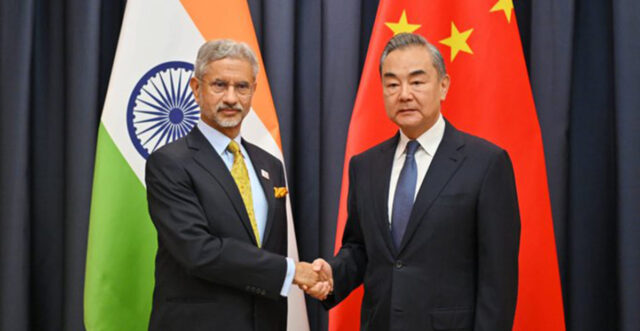How do India and China get around the freeze in their relationship since the Galwan clash?
At the end of their discussions in Astana, Kazakhstan on the sidelines of the SCO summit, it was clear that External Affairs Minister Jaishankar and his Chinese counterpart Wang Yi had agreed to disagree but also signalled willingness to move forward in certain areas. Here’s how it played out.
First of all there was no joint statement with both sides issuing separate readouts on their meeting.
The MEA statement said “EAM highlighted the need to achieve complete disengagement from the remaining areas in Eastern Ladakh and restore border peace and tranquility. He reaffirmed the importance of abiding by relevant bilateral agreements, protocols and understandings … reached in the past. The Line of Actual Control must be respected …”
Interestingly there was no reference to restoring status quo ante, meaning both sides pulling back troops to locations prior to the Galwan clash. But Prof Srikanth Kondapalli of Jawaharlal Nehru University says status quo ante has not been mentioned by India in the last three years.
Peace and tranquility is mentioned, which may give the diplomats more flexibility in negotiations.
The statement said both sides would step up meetings at the diplomatic and military level and schedule an early meeting of the Working Mechanism on Consultation and Coordination on India China Border Affairs. This is seen as a positive.
The statement from the Chinese side was on familiar lines with more than a hint of what China expected India to do. Here’s a sample:
“We must adhere to positive thinking, on the one hand properly handle and control the situation in the border area, on the other hand actively resume normal exchanges, promote each other and move towards each other.”
Also, reiteration of some old advice.
“The two sides should view bilateral relations from a strategic height, strengthen communication, properly handle differences, and ensure that China-India relations move forward along a healthy and stable track.”
Some China watchers in India believe Wang Yi was making an effort to reach out and assure India of his country’s good intentions.
“We are willing to follow the series of important consensuses reached by the leaders of the two countries, respect each other, understand each other, trust each other, take care of each other … and explore the correct way for the two neighboring countries to get along.”
But others say it is typical for the Chinese to lecture about trust when their actions have only undermined it. India, for its part, seems to believe that the larger relationship can wait (including curbs on Chinese investment) until the border issue is settled first.
But it may not be all that cut and dried. Kondapalli points to Jaishankar referring to the challenges India and China face and their “broad common interests”.
“India will adhere to an independent foreign policy,” he said, “adhere to the concept of multilateralism, promote multi-polarization, and safeguard the common interests of developing countries.”
This could be music to China’s ears since it has always been wary of India in the US camp. The weeks ahead promise to be interesting.
Thirty eight years in journalism, widely travelled, history buff with a preference for Old Monk Rum. Current interest/focus spans China, Technology and Trade. Recent reads: Steven Colls Directorate S and Alexander Frater's Chasing the Monsoon. Netflix/Prime video junkie. Loves animal videos on Facebook. Reluctant tweeter.





